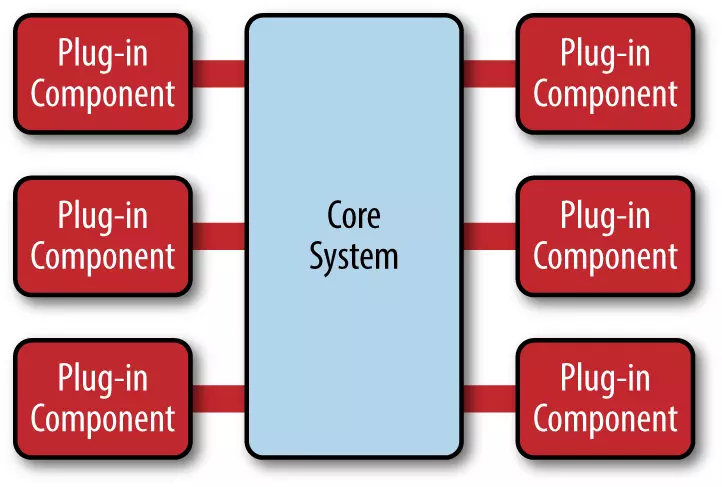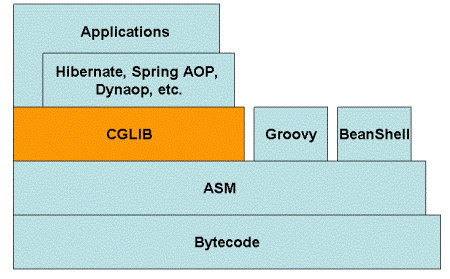The microkernel architecture pattern allows you to add additional application features as plug-ins to the core application, providing extensibility as well as feature separation and isolation. The microkernel architecture pattern consists of two types of architecture components: a core system and plug-in modules. Application logic is divided between independent plug-in modules and the basic core system, providing extensibility, flexibility, and isolation of application features and custom processing logic.

1: Oriented-Interface Plug-in development
2: Using Interceptor to develop Plug-in
3: Poxy or Reflection also can be used in Plug-in development (InvocationHandler)
https://blog.csdn.net/huxiaoyonglan1/article/details/72956184

https://blog.csdn.net/danchu/article/details/70238002
public class JavassistProxyFactory extends AbstractProxyFactory {
@SuppressWarnings("unchecked")
public <T> T getProxy(Invoker<T> invoker, Class<?>[] interfaces) {
return (T) Proxy.getProxy(interfaces).newInstance(
new InvokerInvocationHandler(invoker)
);
}
public <T> Invoker<T> getInvoker(T proxy, Class<T> type, URL url) {
final Wrapper wrapper = Wrapper.getWrapper(
proxy.getClass().getName().indexOf('$') < 0 ?
proxy.getClass() : type);
return new AbstractProxyInvoker<T>(proxy, type, url) {
@Override
protected Object doInvoke(T proxy, String methodName,
Class<?>[] parameterTypes,
Object[] arguments) throws Throwable {
return wrapper.invokeMethod(proxy, methodName, parameterTypes, arguments);
}
};
}
}
public static <T> T create(Class<T> interfaceClass) {
return (T) Proxy.newProxyInstance(interfaceClass.getClassLoader(),new Class<?>[]{interfaceClass},new ObjectProxy<T>(interfaceClass)
);
}
public static <T> IAsyncObjectProxy createAsync(Class<T> interfaceClass) {
return new ObjectProxy<T>(interfaceClass);
}
public class ObjectProxy<T> implements InvocationHandler, IAsyncObjectProxy {
private static final Logger LOGGER = LoggerFactory.getLogger(ObjectProxy.class);
private Class<T> clazz;
public ObjectProxy(Class<T> clazz) {
this.clazz = clazz;
}
//for synchronized call, package the call with classname, method, arguments
@Override
public Object invoke(Object proxy, Method method, Object[] args) throws Throwable {
if (Object.class == method.getDeclaringClass()) {
String name = method.getName();
if ("equals".equals(name)) {
return proxy == args[0];
} else if ("hashCode".equals(name)) {
return System.identityHashCode(proxy);
} else if ("toString".equals(name)) {
return proxy.getClass().getName() + "@" +
Integer.toHexString(System.identityHashCode(proxy)) +
", with InvocationHandler " + this;
} else {
throw new IllegalStateException(String.valueOf(method));
}
}
//package the classname, method, types of arguments and arguments,additional request id
RpcRequest request = new RpcRequest();
request.setRequestId(UUID.randomUUID().toString());
request.setClassName(method.getDeclaringClass().getName());
request.setMethodName(method.getName());
request.setParameterTypes(method.getParameterTypes());
request.setParameters(args);
// Debug
LOGGER.debug(method.getDeclaringClass().getName());
LOGGER.debug(method.getName());
for (int i = 0; i < method.getParameterTypes().length; ++i) {
LOGGER.debug(method.getParameterTypes()[i].getName());
}
for (int i = 0; i < args.length; ++i) {
LOGGER.debug(args[i].toString());
}
//get one client from list of client
RpcClientHandler handler = ConnectManage.getInstance().chooseHandler();
//send rpc message to rpc server and wait for results
RPCFuture rpcFuture = handler.sendRequest(request);
return rpcFuture.get();
}
@Override
public RPCFuture call(String funcName, Object... args) {
RpcClientHandler handler = ConnectManage.getInstance().chooseHandler();
RpcRequest request = createRequest(this.clazz.getName(), funcName, args);
RPCFuture rpcFuture = handler.sendRequest(request);
return rpcFuture;
}
}
public class RpcClient implements InvocationHandler {
@SuppressWarnings("unchecked")
public <T> T proxy(Class<T> interfaceClass) throws Throwable {
if (!interfaceClass.isInterface()) {
throw new IllegalArgumentException(interfaceClass.getName()
+ " is not an interface");
}
return (T) Proxy.newProxyInstance(interfaceClass.getClassLoader(),new Class<?>[] { interfaceClass }, this);
}
@Override
public RpcClient interfaceClass(Class<?> interfaceClass) {
// TODO Auto-generated method stub
this.interfaceClass=interfaceClass;
return this;
}
@Override
public RpcClient version(String version) {
// TODO Auto-generated method stub
this.version=version;
return this;
}
@Override
public RpcClient clientTimeout(int clientTimeout) {
// TODO Auto-generated method stub
this.timeout=clientTimeout;
return this;
}
@Override
public RpcConsumer hook(ConsumerHook hook) {
// TODO Auto-generated method stub
this.hook=hook;
return this;
}
@Override
public Object instance() {
try {
return proxy(this.interfaceClass);
}
catch (Throwable e)
{
e.printStackTrace();
}
return null;
}
@Override
public void asynCall(String methodName) {
asynCall(methodName, null);
}
@Override
public <T extends ResponseCallbackListener> void asynCall(String methodName, T callbackListener) {
this.asyncMethods.put(methodName, callbackListener);
this.connection.setAsyncMethod(asyncMethods);
for (RpcConnection conn:connection_list)
{
conn.setAsyncMethod(asyncMethods);
}
}
@Override
public void cancelAsyn(String methodName) {
this.asyncMethods.remove(methodName);
this.connection.setAsyncMethod(asyncMethods);
for (RpcConnection conn:connection_list)
{
conn.setAsyncMethod(asyncMethods);
}
}
@Override
public Object invoke(Object proxy, Method method, Object[] args) throws Throwable {
List<String> parameterTypes = new LinkedList<String>();
for (Class<?> parameterType : method.getParameterTypes()) {
parameterTypes.add(parameterType.getName());
}
RpcRequest request = new RpcRequest();
request.setRequestId(UUID.randomUUID().toString());
request.setClassName(method.getDeclaringClass().getName());
request.setMethodName(method.getName());
request.setParameterTypes(method.getParameterTypes());
request.setParameters(args);
if(hook!=null)
hook.before(request);
RpcResponse response = null;
try
{
request.setContext(RpcContext.props);
response = (RpcResponse) select().Send(request,asyncMethods.containsKey(request.getMethodName()));
if(hook!=null)
hook.after(request);
if(!asyncMethods.containsKey(request.getMethodName())&&response.getExption()!=null)
{
Throwable e=(Throwable) Tool.deserialize(response.getExption(),response.getClazz());
throw e.getCause();
}
}
catch (Throwable t)
{
//t.printStackTrace();
//throw new RuntimeException(t);
throw t;
}
finally
{
// if(asyncMethods.containsKey(request.getMethodName())&&asyncMethods.get(request.getMethodName())!=null)
// {
// cancelAsyn(request.getMethodName());
// }
}
if(response==null)
{
return null;
}
else if (response.getErrorMsg() != null)
{
throw response.getErrorMsg();
}
else
{
return response.getAppResponse();
}
}
}
public class ProxyFactory implements MethodInterceptor {
private Object obj;
public Object createProxy(Object target) {
this.obj = target;
Enhancer enhancer = new Enhancer();
enhancer.setSuperclass(this.obj.getClass());
enhancer.setCallback(this);
enhancer.setClassLoader(target.getClass().getClassLoader());
return enhancer.create();
}
@Override
public Object intercept(Object obj, Method method, Object[] args, MethodProxy proxy) throws Throwable {
Object result = null;
try {
before();
result = proxy.invokeSuper(obj, args);
after();
} catch (Exception e) {
exception();
}finally{
beforeReturning();
}
return result;
}
}
Hello hello = new Hello();
ProxyFactory cglibProxy = new ProxyFactory();
Hello proxy = (Hello) cglibProxy.createProxy(hello);
String result=proxy.sayHello(true);
//////////////////////////////////////////////////////
Enhancer enhancer = new Enhancer();
enhancer.setSuperclass(SampleClass.class);
enhancer.setCallback(new FixedValue() {
@Override
public Object loadObject() throws Exception {
return "Hello cglib!";
}
});
SampleClass proxy = (SampleClass) enhancer.create();
////////////////////////////////////////////////////////
Enhancer enhancer = new Enhancer();
enhancer.setSuperclass(SampleClass.class);
enhancer.setCallback(new InvocationHandler() {
@Override
public Object invoke(Object proxy, Method method, Object[] args)
throws Throwable {
if(method.getDeclaringClass() != Object.class && method.getReturnType() == String.class) {
return "Hello cglib!";
} else {
throw new RuntimeException("Do not know what to do.");
}
}
});
SampleClass proxy = (SampleClass) enhancer.create();
/////////////////////////////////////////////////////////////////
Enhancer enhancer = new Enhancer();
enhancer.setSuperclass(SampleClass.class);
enhancer.setCallbackFilter(new filter());
enhancer.setCallback(new MethodInterceptor() {
@Override
public Object intercept(Object obj, Method method, Object[] args, MethodProxy proxy)
throws Throwable {
if(method.getDeclaringClass() != Object.class && method.getReturnType() == String.class) {
return "Hello cglib!";
} else {
return proxy.invokeSuper(obj, args);
}
}
});
SampleClass proxy = (SampleClass) enhancer.create();
//////////////////////////////////////////////////////////////////
https://www.jianshu.com/p/20203286ccd9